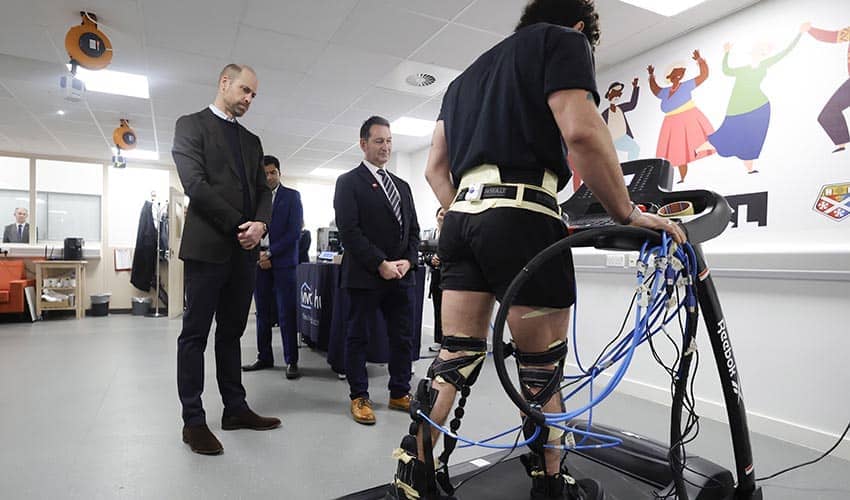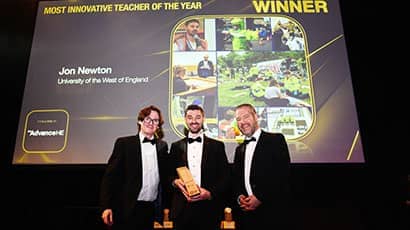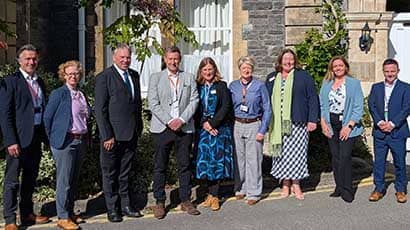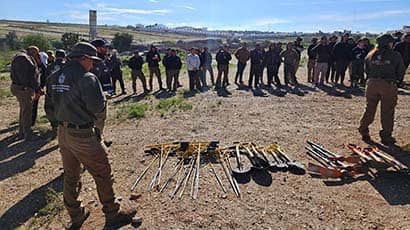Voice-activated AI system could improve construction worker safety, productivity and efficiency

Construction workers could soon benefit from voice-activated technology that beams real-time audio instructions in their earpiece, and augmented reality (AR) graphics onto their helmet visor, thanks to technology being developed at the University of the West of England (UWE Bristol). Using artificial intelligence (AI), the system will voice and display information, thereby removing the need for walkie-talkies or consulting hard copies of blueprints.
The conversational AI technology is being developed by UWE Bristol's Big Data Enterprise and Artificial Intelligence Laboratory (Big-DEAL) alongside leading construction firms, which include Costain, Winvic Construction Ltd, TerOpta, Enable My Team, and Geo Green Power.
The total project cost is £1.86 million funded by UKRI and EPSRC under the ISCF programme. The project started in January 2019 and it will last for three years.
Conversational AI refers to a technology that allows the user to verbally ask for and receive information in real-time from a computer. Two examples of existing products that use this form of artificial intelligence in the home are Amazon Alexa and Google Home.
"Until now, conversational AI has mostly been used in labs and controlled settings," said Professor Lukumon Oyedele, who is Assistant Vice-Chancellor for Digital Innovation and Enterprise at UWE Bristol. "Here we are bringing it into a construction environment, where workers are using their hands and need a quick and effective way to gather information."
Typical commands could include 'Show me building plans' or 'show me construction sequence.' The system will then supply them with immediate on-screen information, or instructions such as where to insert a screw in a structure. A guiding system using arrows on the head-mounted display or an hand-held device, could also show them how to get to a specific area.
This data can also be provided as audio information in the worker's headphones. "One of the many challenges is to ensure that the instructions are audible and stand out, given that there is a lot of background noise on a busy construction site," said Professor Oyedele. "We are therefore looking at technologies including noise-cancellation to allow for this," he added.
As well as guiding the workers on the building site, the system is to provide information for project managers, who will be able to access co-workers' timesheets and know where they are located on site at any given time, as well as the status of various elements of the project.
"We hope that this technology will augment workers' capabilities, to make construction more efficient. It is about improving worker's productivity, ensuring a faster delivery process and getting it right the first time by avoiding defects," said Professor Oyedele.
Tim Reeve, Technical Director at Winvic Construction Ltd, said: "It's a real honour to be working with Professor Oyedele on his research project. AI can have relevant applications in unexpected places, and Winvic is eager to test the voice-activated headset that our data is helping to create.
"As our main focus is meeting clients' needs – from a practical delivery point of view and also commercially – it was a natural progression for Winvic to become an early adopter of state-of-the-art BIM (Building Information Modelling) technology and we remain committed to digitally transforming construction."
Related news

22 January 2026
Prince of Wales visits UWE Bristol to see pioneering robotic tech tackling societal health challenges
The Prince of Wales visited the Bristol Robotics Laboratory (BRL) at the University of the West of England’s (UWE Bristol) Frenchay campus today (22 January 2026) to learn about the pioneering robotic technologies being developed to help the ageing and disabled population maintain mental and physical wellbeing and remain independent for longer.

21 January 2026
Dementia support groups developed by professor adopted across globe
A programme started by a UWE Bristol academic to provide emotional and practical support for people with dementia is now being adopted around the world.

12 December 2025
UWE Bristol’s environmentally conscious and student-focused accommodation wins three awards
Purdown View, the world's largest certified Passivhaus student accommodation development, has been recognised at Property Week Student Accommodation Awards.

25 November 2025
Health-tech start up MyCelsius launches breakthrough cooling tech for hot flushes developed at UWE Bristol’s Launch Space
A pioneering Bristol-based health-tech company developing cutting-edge cooling technology for hot flushes has credited UWE Bristol’s Launch Space incubator with playing a key role in accelerating its product development.

14 November 2025
Lecturer wins prestigious Times Higher Education award for innovation in teaching
A senior paramedic science lecturer at UWE Bristol has been named the most innovative teacher of the year in the Times Higher Education Awards 2025.

13 November 2025
Alliance Medical and UWE Bristol launch UK’s first PET-CT postgraduate certificate
In a move set to transform imaging education, Alliance Medical (AML) and UWE Bristol have joined forces to co-design and develop the UK’s first PET-CT Postgraduate Certificate (PG Cert).

13 November 2025
New AI research to revolutionise animal welfare
A UWE Bristol research project will combine behavioural science and AI to create technology that understands not only what animals do, but how they feel.

29 October 2025
UWE Bristol academic unveils breakthrough in energy-efficient AI at NATO science forum
Dr Jonathan Lancelot has developed a new form of AI that could transform how intelligent machines operate in space, defence, and remote environments.

07 October 2025
Academic playing role in project to find hidden graves in Mexico using drone technology
A UWE Bristol lecturer is playing a part in a project using drone technology to locate concealed graves in Mexico.

01 October 2025
New funding for researchers to develop trustworthy clinical AI for assessing brain activity
Researchers have received funding from UK Research and Innovation to help bring their innovative brain-monitoring AI technology closer to real-world use.

11 September 2025
New study to investigate augmented reality as an intervention for emotionally based school avoidance
A UWE Bristol researcher will support a new study exploring whether an augmented reality board game can help young people with emotionally based school avoidance (EBSA).

22 August 2025
A decade of Future Space: How UWE Bristol’s enterprise zone is powering innovation and economic growth
Tracey John, Director of Research and External Engagement, reflects on the impact of Future Space and its role as a launchpad for cutting-edge companies shaping the future of how we live and work.






